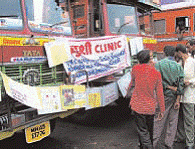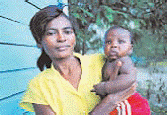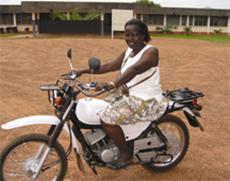Improving the health and well-being of the world’s poorest and most vulnerable people
Studying the health needs of men who have sex with men
Some African leaders deny the existence of men who have sex with men, or categorize their sexual behavior as “un-African.” But these men represent a vulnerable and hidden group living with HIV in Africa. An estimated 25 percent of men who have sex with men in coastal Kenya and 22 percent in Dakar, Senegal, are living with HIV. Stigma, discrimination, violence, and criminalization inhibit men who have sex with men from seeking needed information and services—globally, fewer than one in 20 such men have access to HIV prevention and care.

The Population Council worked with truckers in India to help them reduce their HIV risk behaviors. Photo: Population Council/Sarat Pradhan.
The Population Council has conducted groundbreaking work in Brazil, Burkina Faso, India, Kenya, Mali, Paraguay, and Senegal to identify and provide support to men who have sex with men. All work is carried out in partnership with local institutions. We seek the best ways to address the health and HIV-prevention needs of these men. Our research has found low condom use, high levels of violence, and resistance to seeking health care among these men—even when they experience symptoms—for fear of exposing their sexual behavior. Our findings have helped ministries of health, which have used the evidence we’ve generated to make informed HIV policy decisions. For more information, visit http://www.popcouncil.org/publications/popbriefs/pb14(2)_3.html
Overcoming challenges in treating children living with HIV
Approximately one-third of African newborns infected with HIV die before they are one year old, and more than half die before they are two. The Population Council is investigating the best ways to ensure that children infected with HIV receive the treatment they need to survive and thrive.

Many children with HIV in the developing world do not receive timely diagnosis or adequate treatment. The Population Council is investigating ways to improve this situation. Photo: © 2006 Scott Harrison, courtesy of Photoshare.
Population Council research in India, Kenya, and South Africa has shown that many opportunities to diagnose HIV are missed during antenatal and postpartum care as well as during early childhood programs. If this situation can be improved, children will be able to start life-saving treatment earlier.
Most children with HIV in high-HIV-prevalence states of India are diagnosed at age 30 months or older, delaying treatment. Stigma and misinformation related to HIV play a role in this delay. Frequent medication shortages hinder full treatment. Even when medication is free or subsidized, the additional costs of transportation and nutritional supplements can be prohibitive. The Population Council has presented these findings to government and program officials and is committed to finding the best ways to improve the provision of pediatric HIV treatment. For more information, visit http://www.popcouncil.org/publications/popbriefs/pb13(1)_3.html
Improving contraception provision and HIV testing and treatment
Pregnant women need to be told about the risk of mother-to-child transmission of HIV and to be given the informed opportunity for testing and treatment. Additionally, women who recently gave birth or had an abortion, and those who are living with HIV, may have a pressing need for contraception. To determine whether these needs are being met, the Population Council collaborates with local organizations and government ministries to study family planning and HIV services in women’s health care programs, including projects in the Dominican Republic, Haiti, and Nicaragua.

Many women who have recently given birth want to delay their next pregnancy but are not using contraception. The Population Council is studying ways to increase access to family planning services for such women in the Dominican Republic (above), Haiti, and Nicaragua. Photo: © 2003 Sean Hawkey, courtesy of Photoshare.
While the research showed significant progress toward the coordination of services, gaps remained. Insufficient contraceptive supplies and inadequate referral systems were problems common to many facilities. Clinic staff missed opportunities to provide counseling and contraceptives, leaving many women at risk of unplanned pregnancies. Some women with HIV reported that providers had discouraged them from using oral contraceptives in addition to condoms.
The research team recommended to the ministries of health that they develop informational brochures for women in different circumstances. They suggested that nurses be more regularly employed to counsel such women and provide them with contraceptives. Additionally, clinic staff can improve the provision of family planning services by asking each patient a short series of questions, a systematic screening method developed and published by the Population Council. For more information, visit http://www.popcouncil.org/frontiers/orsummaries/ors75.html
A community-based approach to health care

Community health care workers often treat people in rural areas. To be most effective, however, the workers must be trained to provide accurate information and follow-up. The Population Council developed a successful program demonstrating that community health workers can, in many settings, deliver quality services better than clinics and at a lower cost. For more information, visit: http://www.popcouncil.org/projects/SS_GhanaCHPS.html
Back to Population Council main page
Read about research and training materials
Text and photos reprinted from the 2007 Population Council Annual Report and Momentum, December 2008.
